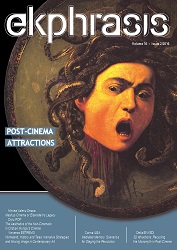Alain Badiou on Cinema from Ideology to Liberation. Placing the Narratives
of Forgiveness in Cinema’s Second Wave of Modernity
Alain Badiou on Cinema from Ideology to Liberation. Placing the Narratives
of Forgiveness in Cinema’s Second Wave of Modernity
Author(s): Oana ŞerbanSubject(s): Fine Arts / Performing Arts
Published by: Universitatea Babeş-Bolyai, Facultatea de Teatru si Televiziune
Keywords: mass art; democratic attraction; affect; emotion; cinema; narratives of attraction; modernity; Badiou
Summary/Abstract: This article aims to coin the concept of “democratic attraction / affect” meaning the power of the cinema, as mass art, to produce the truth both in theory and in practice, as ideology and liberation. My working hypothesis is inspired by Alain Badiou’s perspective on cinema as a paradoxical relationship between an aristocratic component – determined by its elitist discourse, addressed to a qualified public in order to be fully comprehended – and a democratic character – as a native tendency of expressing universal social and cultural ideals of individuals – closely following the French philosopher’s polemics with the arguments of Gilles Deleuze on the cinematic universe. In the first two parts of my research I will explain the characteristics of cinema as mass art and the multiple senses of the so-called “democratic attraction / affect”, the last section of my article being dedicated to a study-case on Udi Aloni’s movie, Forgiveness, in the light of Badiou’s critique on it.
Journal: Ekphrasis. Images, Cinema, Theory, Media
- Issue Year: 16/2016
- Issue No: 2
- Page Range: 61-73
- Page Count: 12
- Language: English

